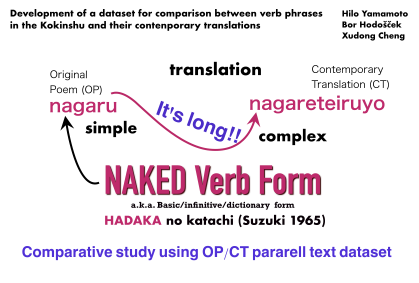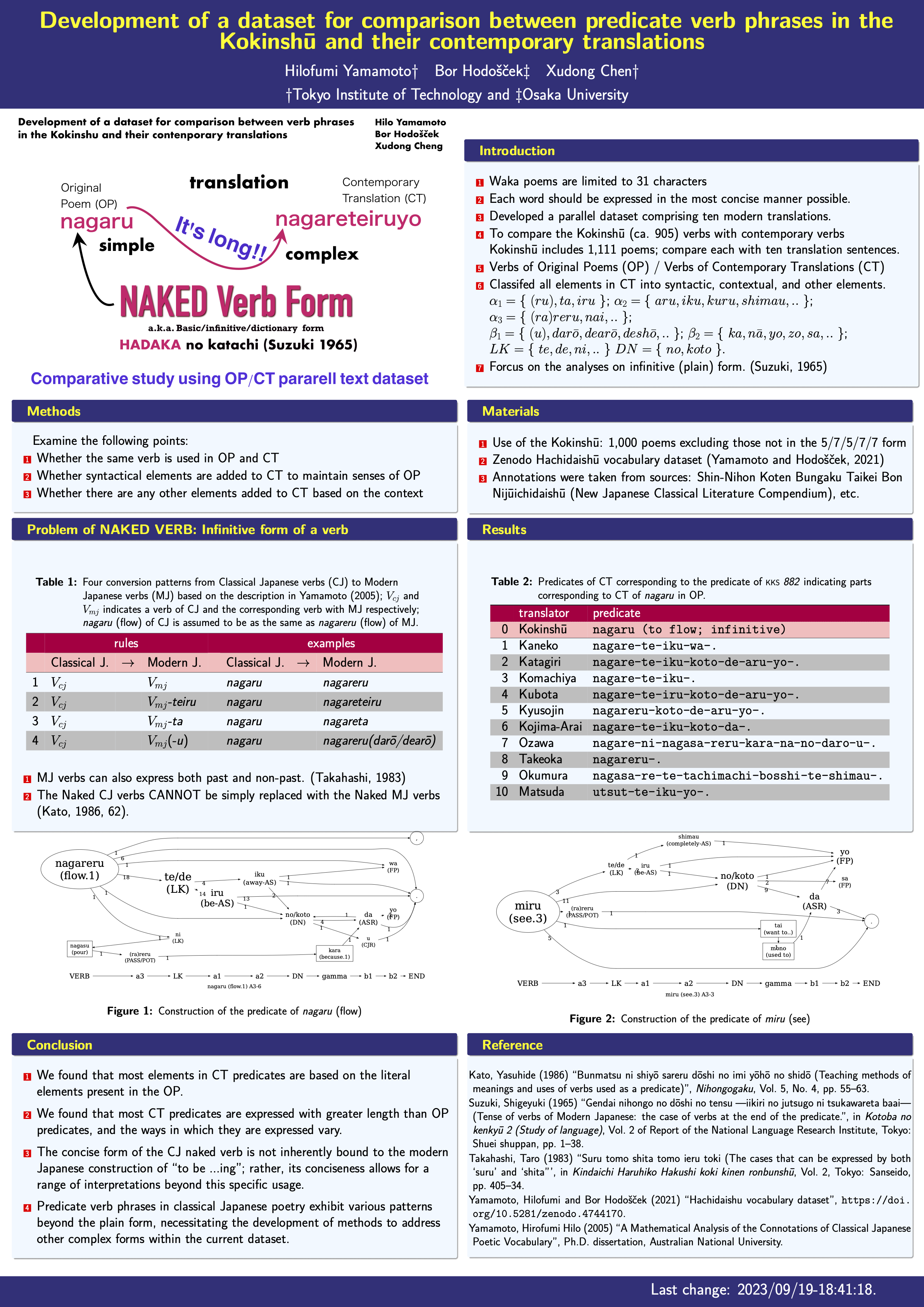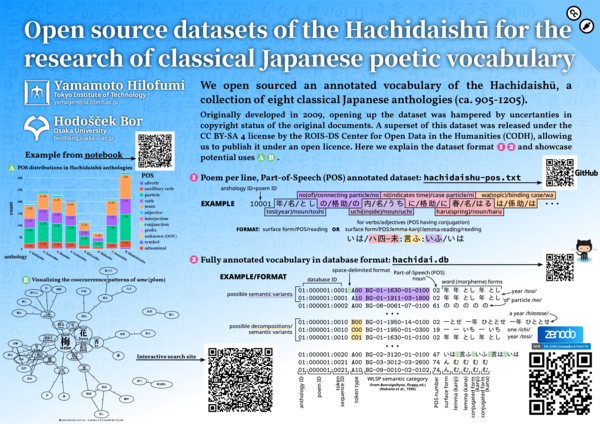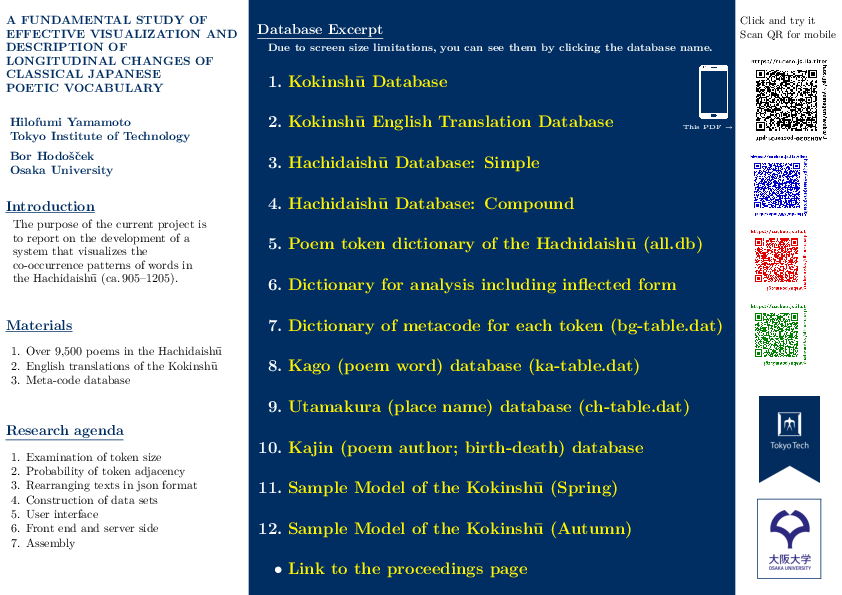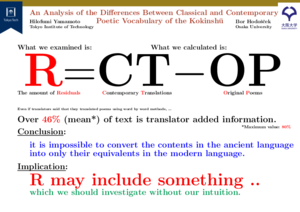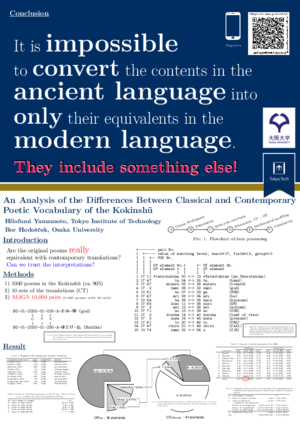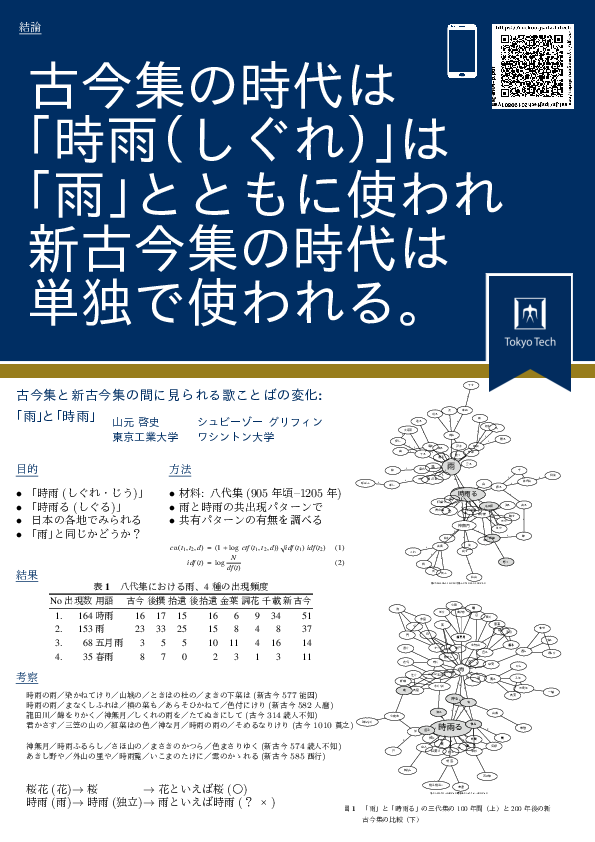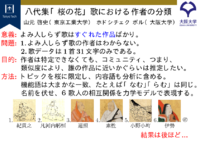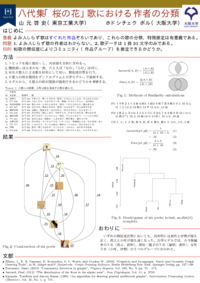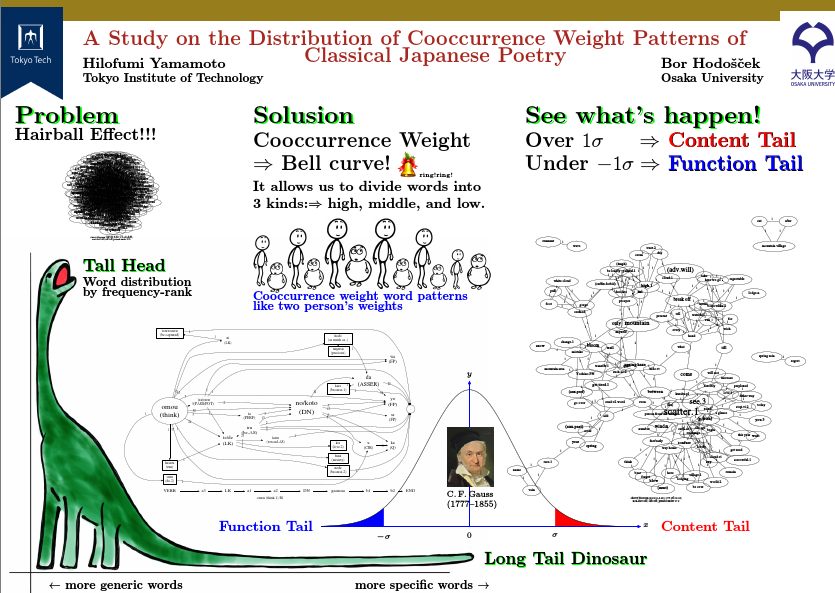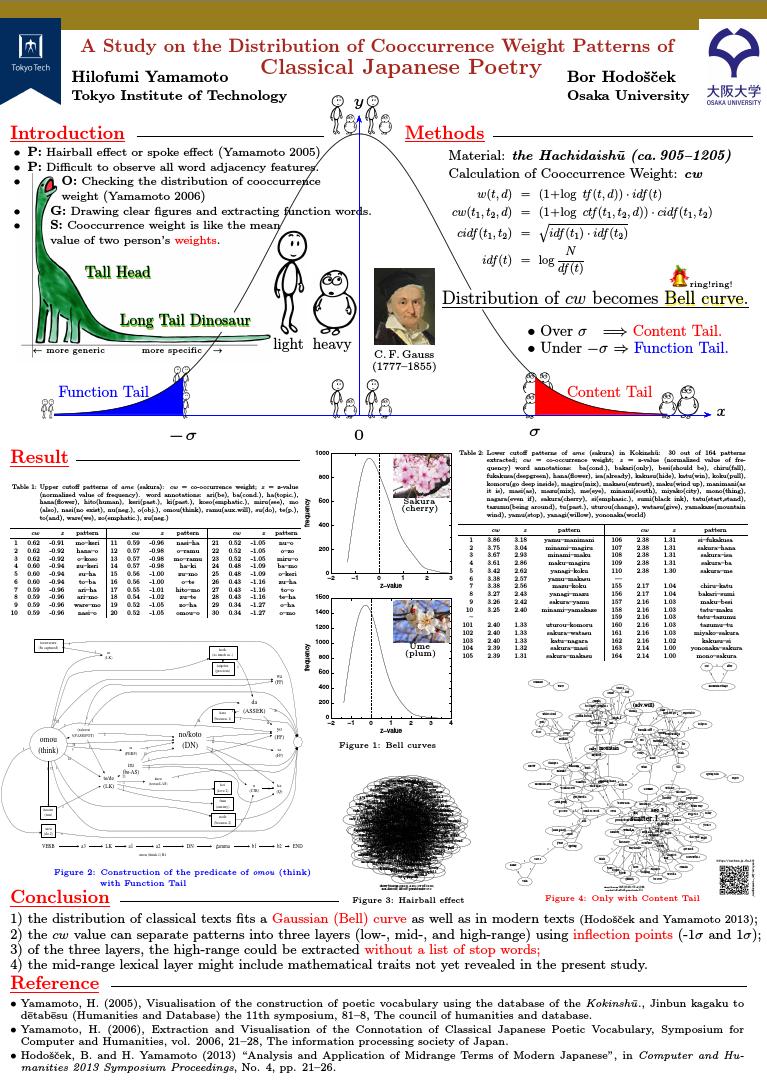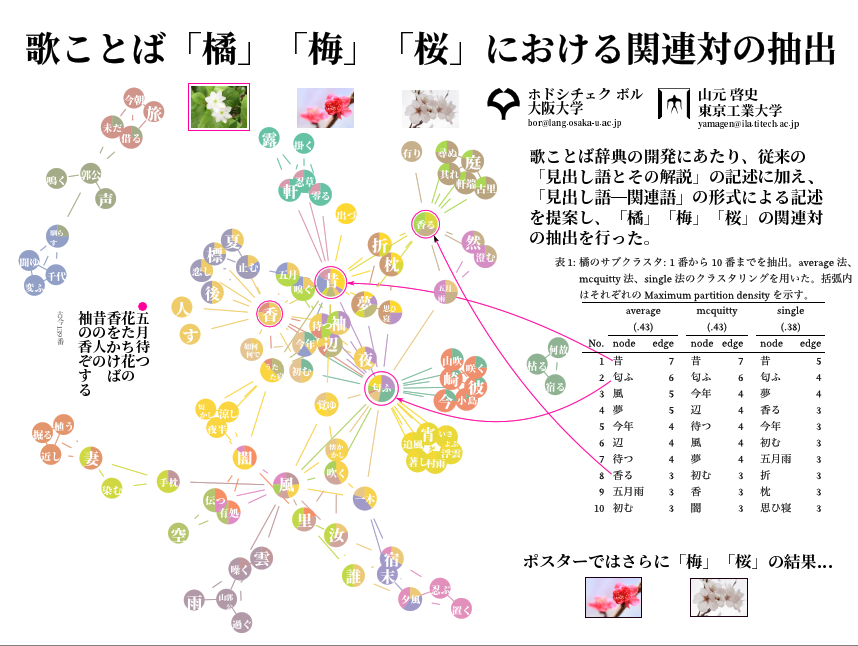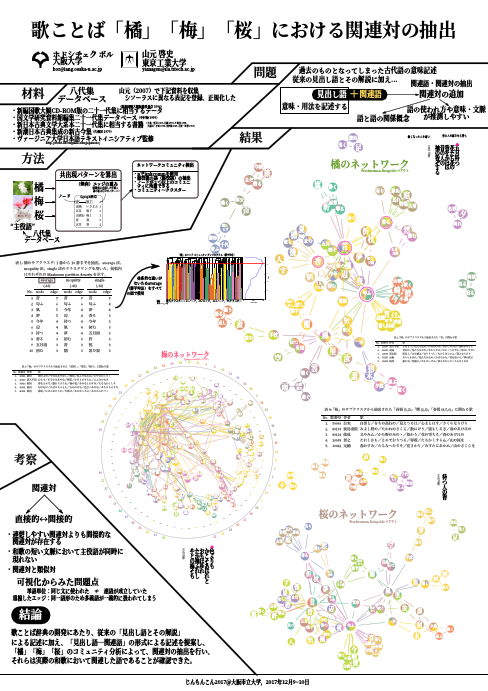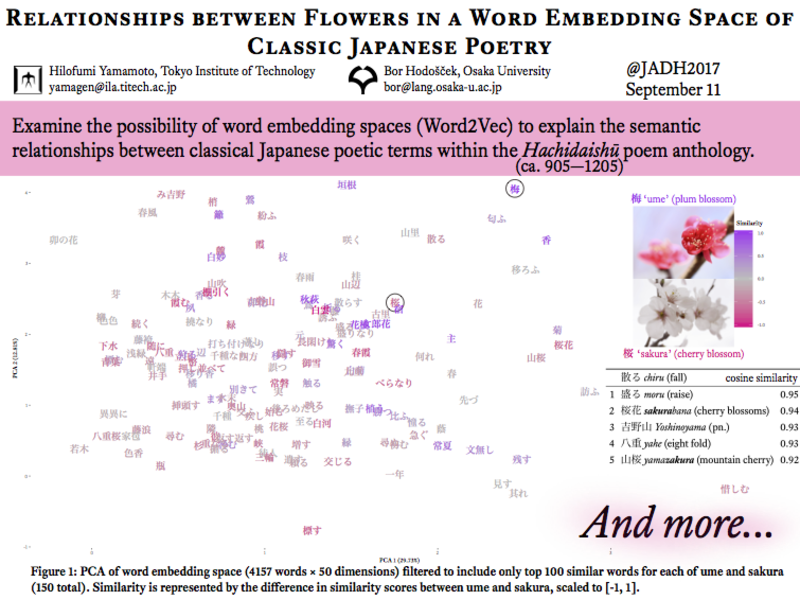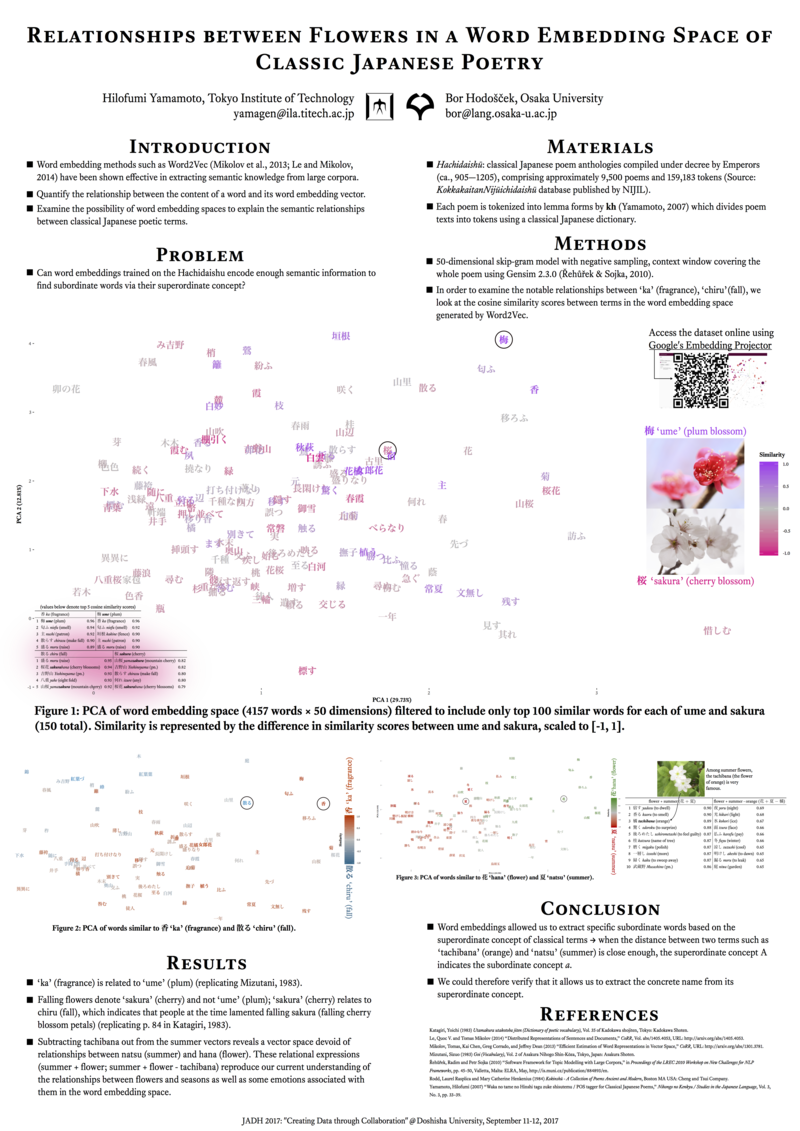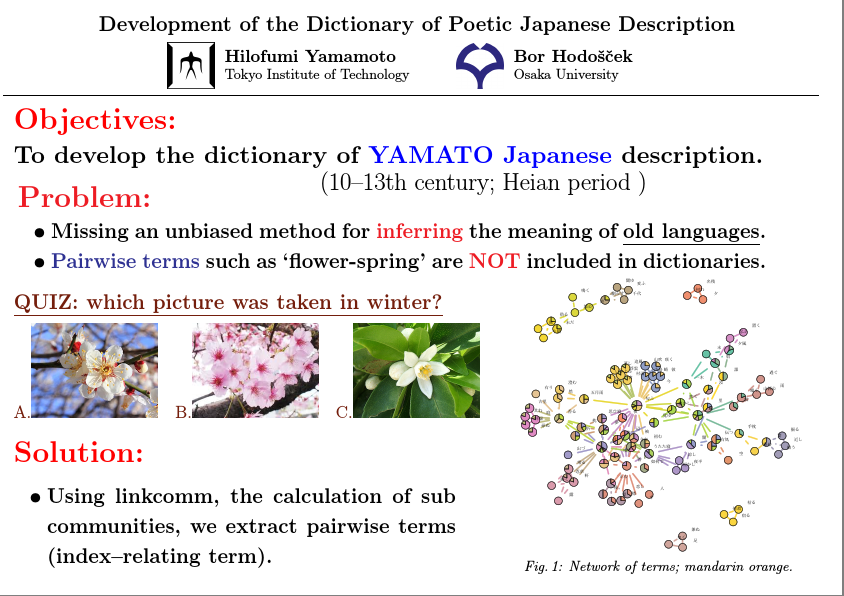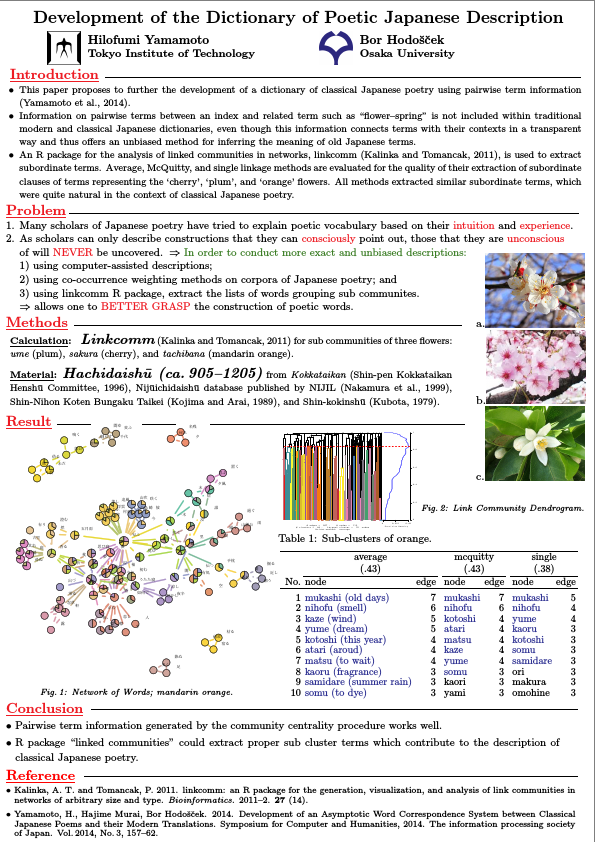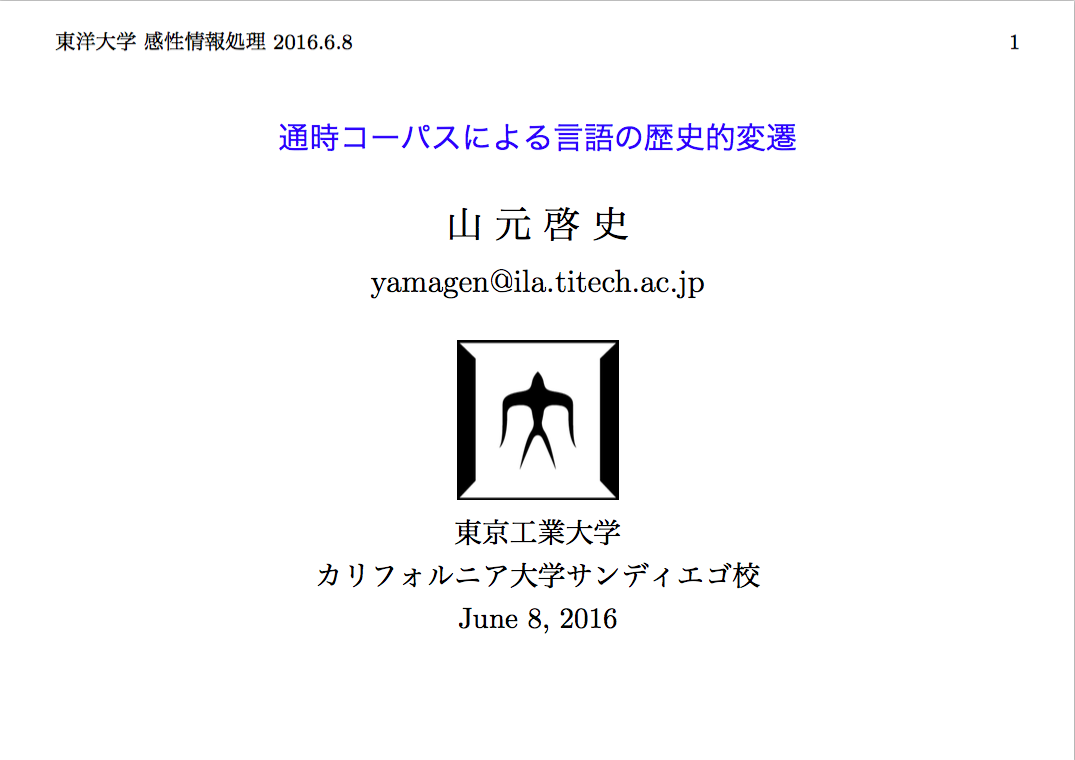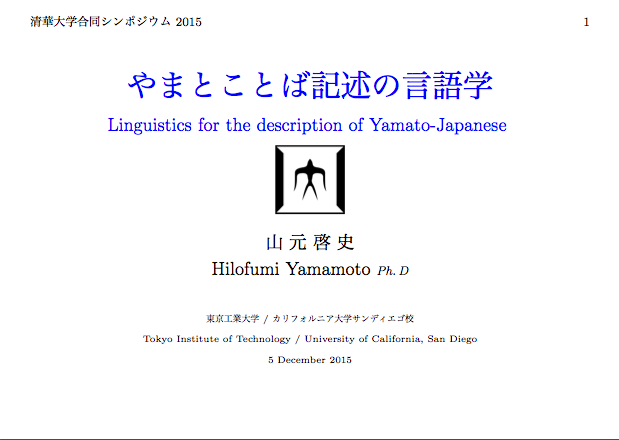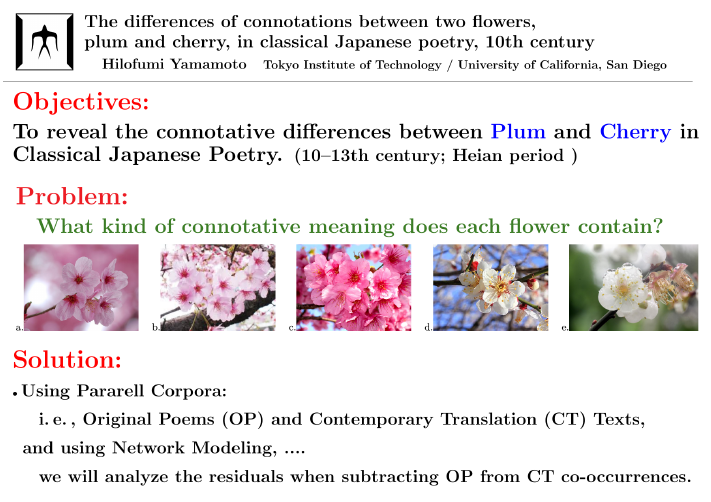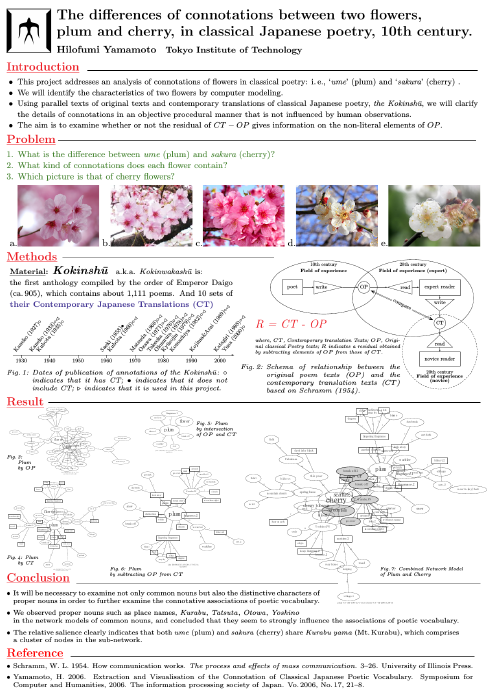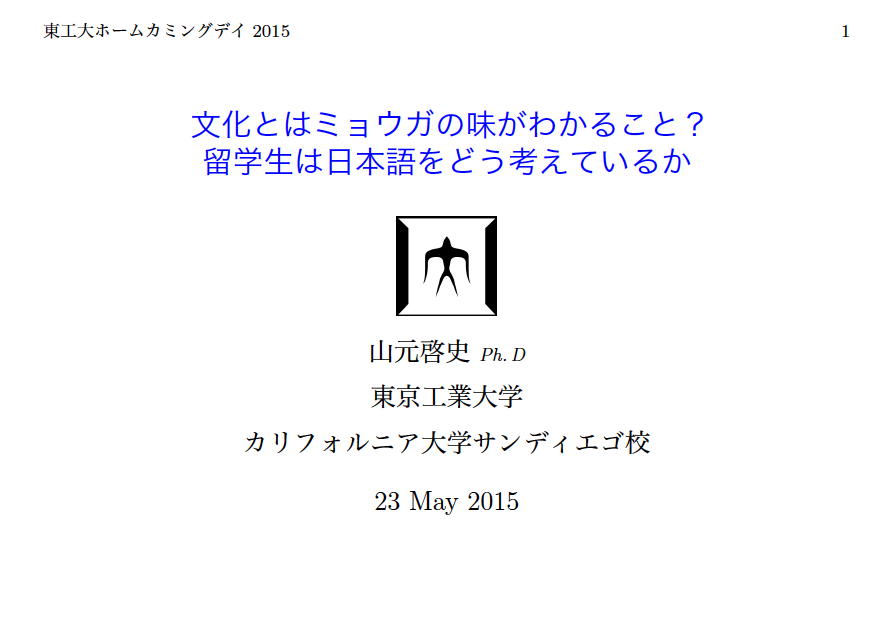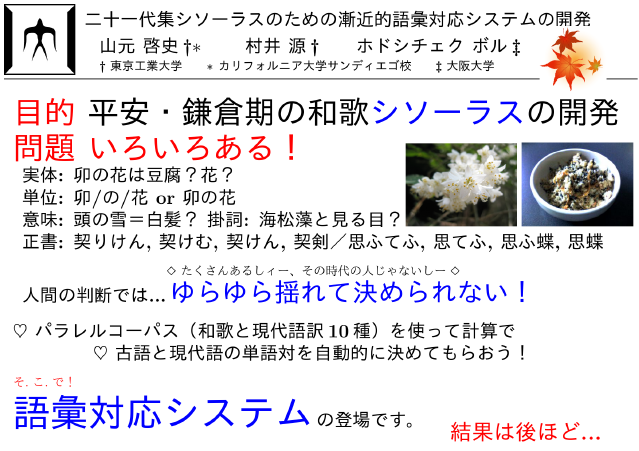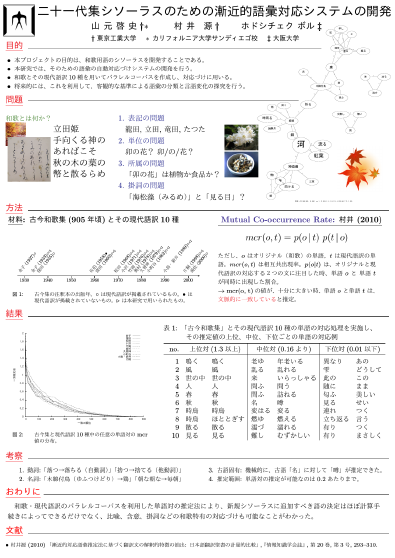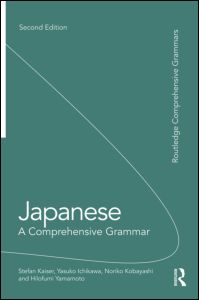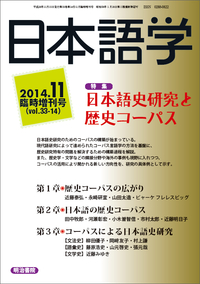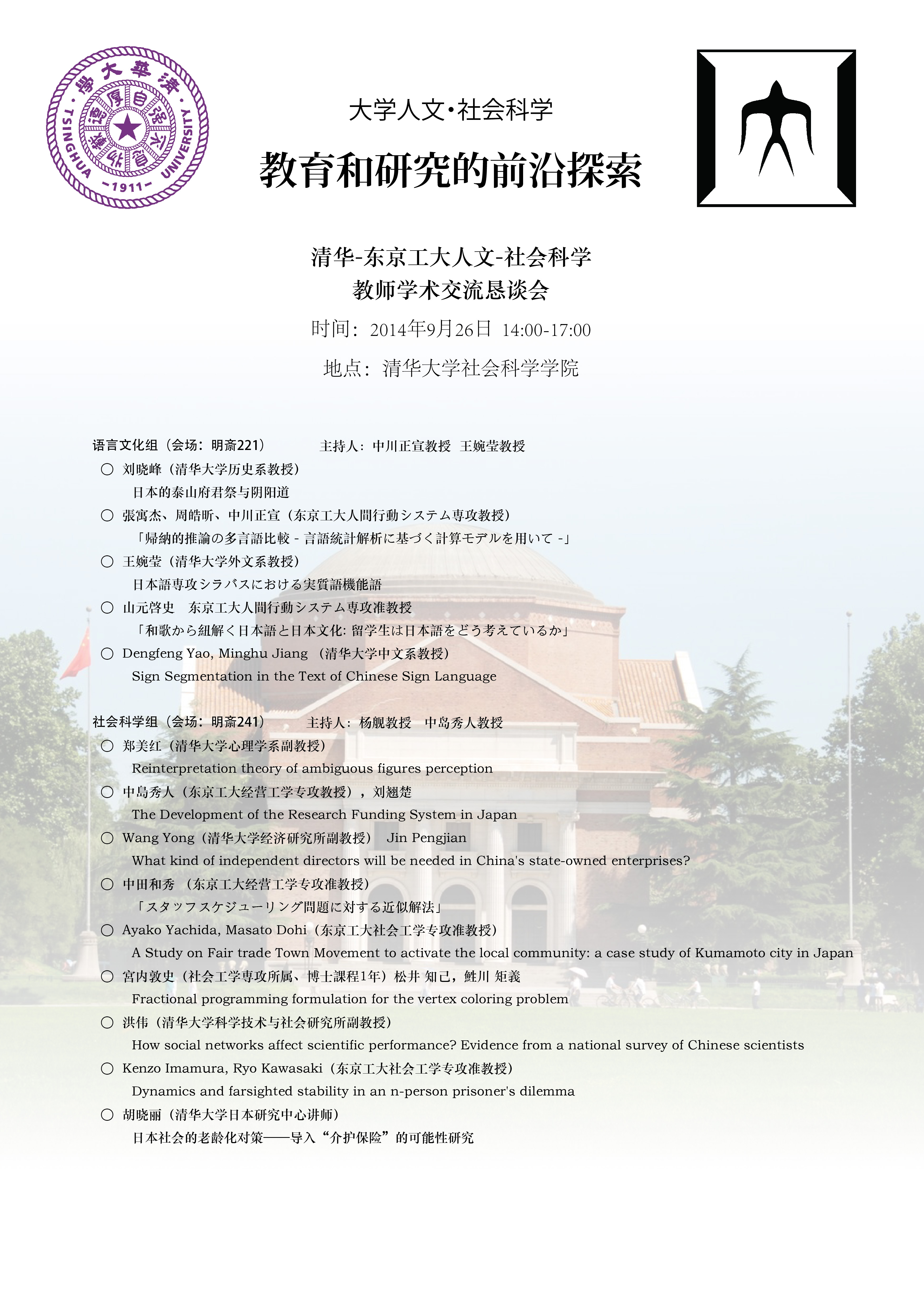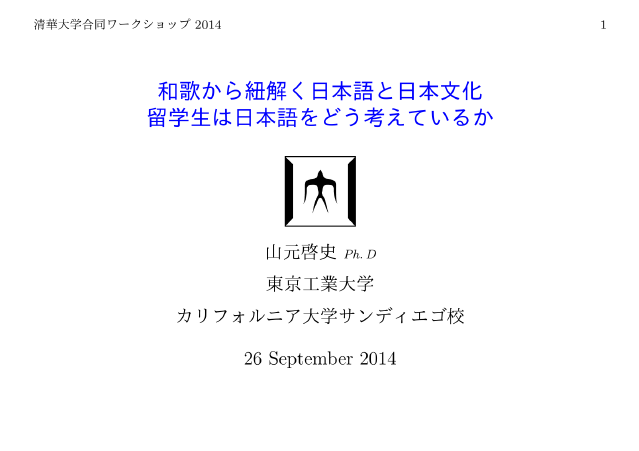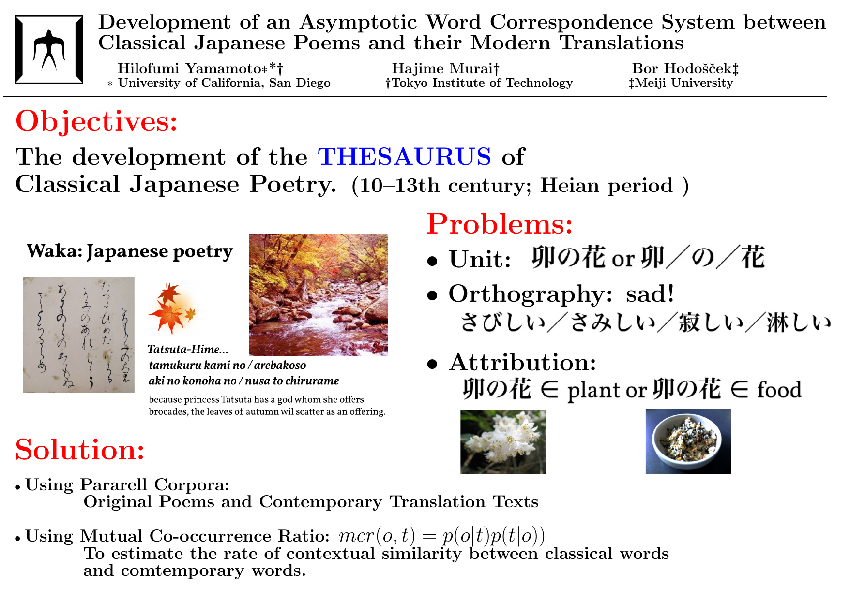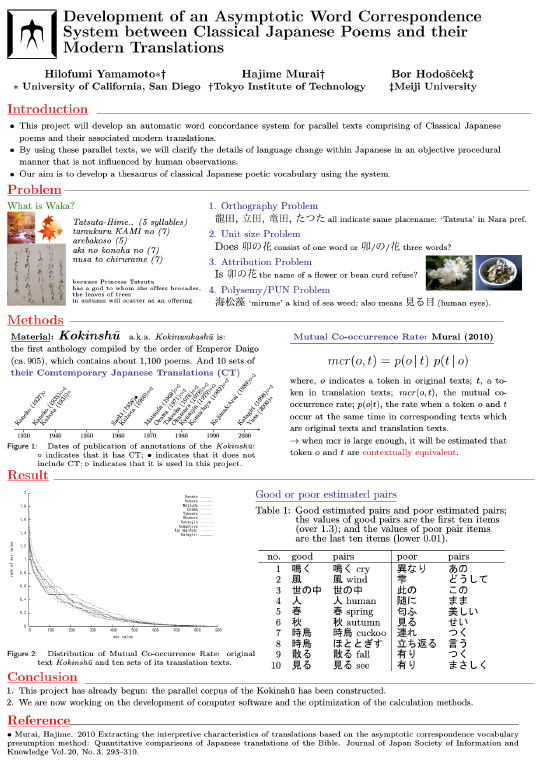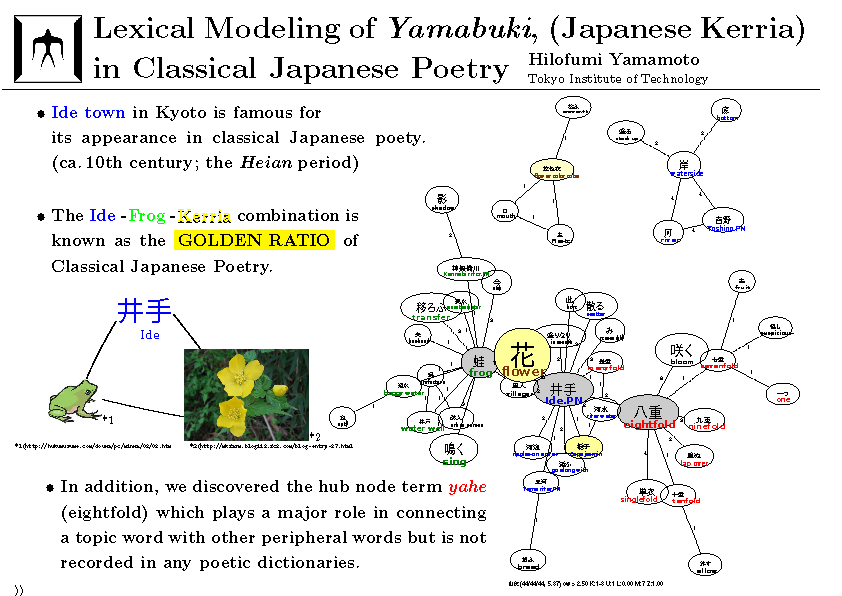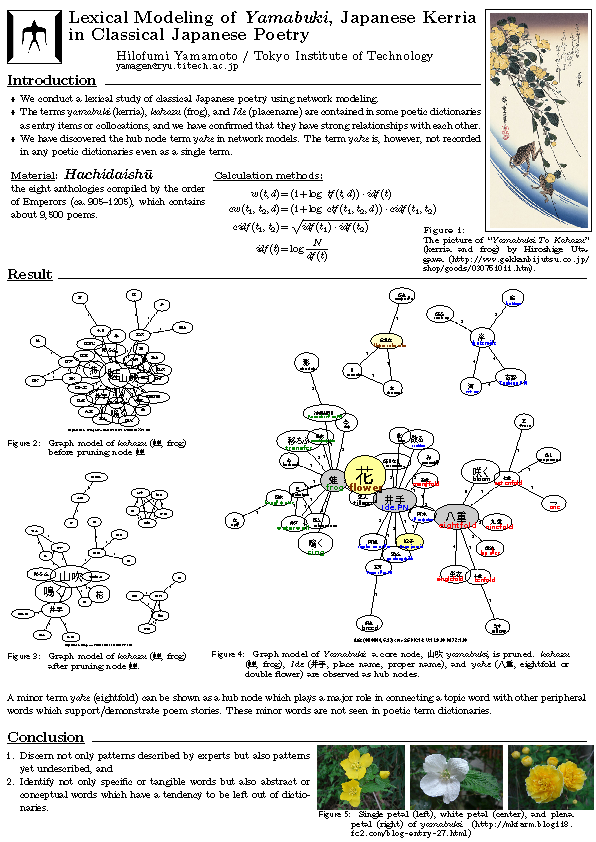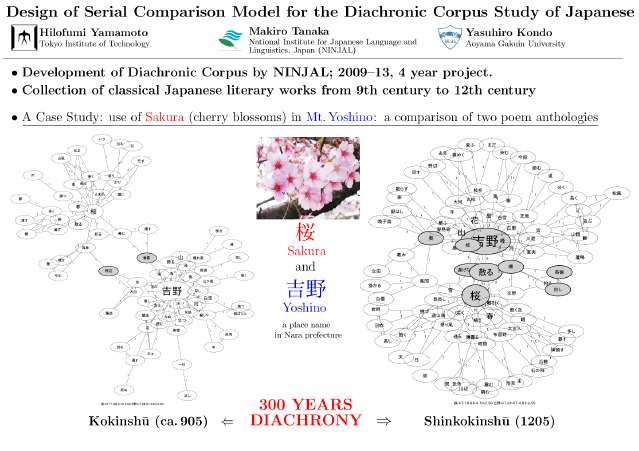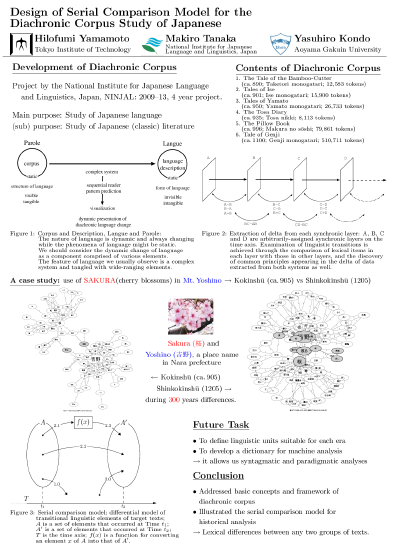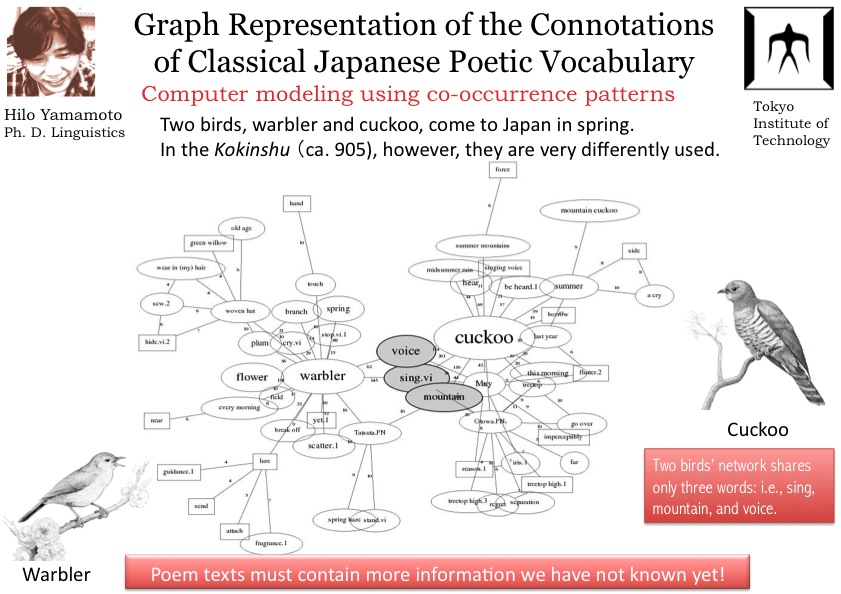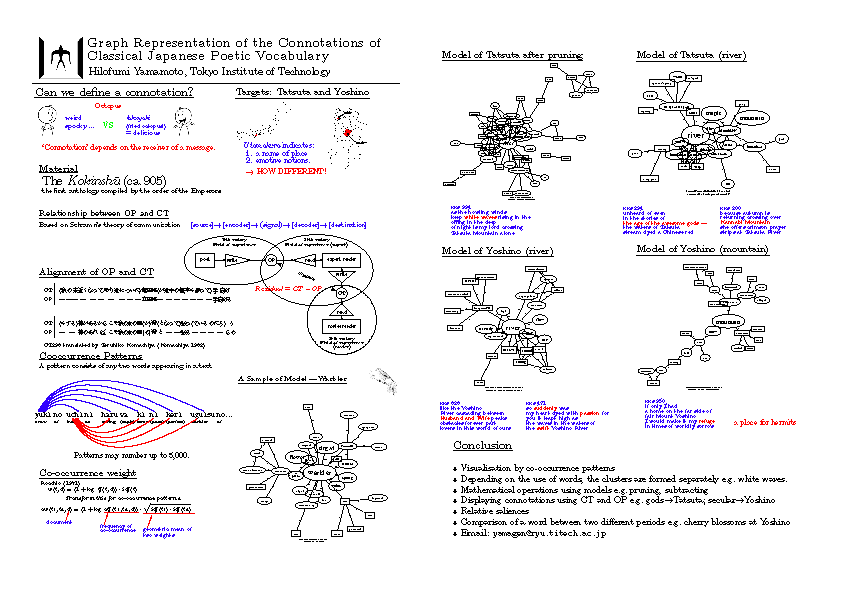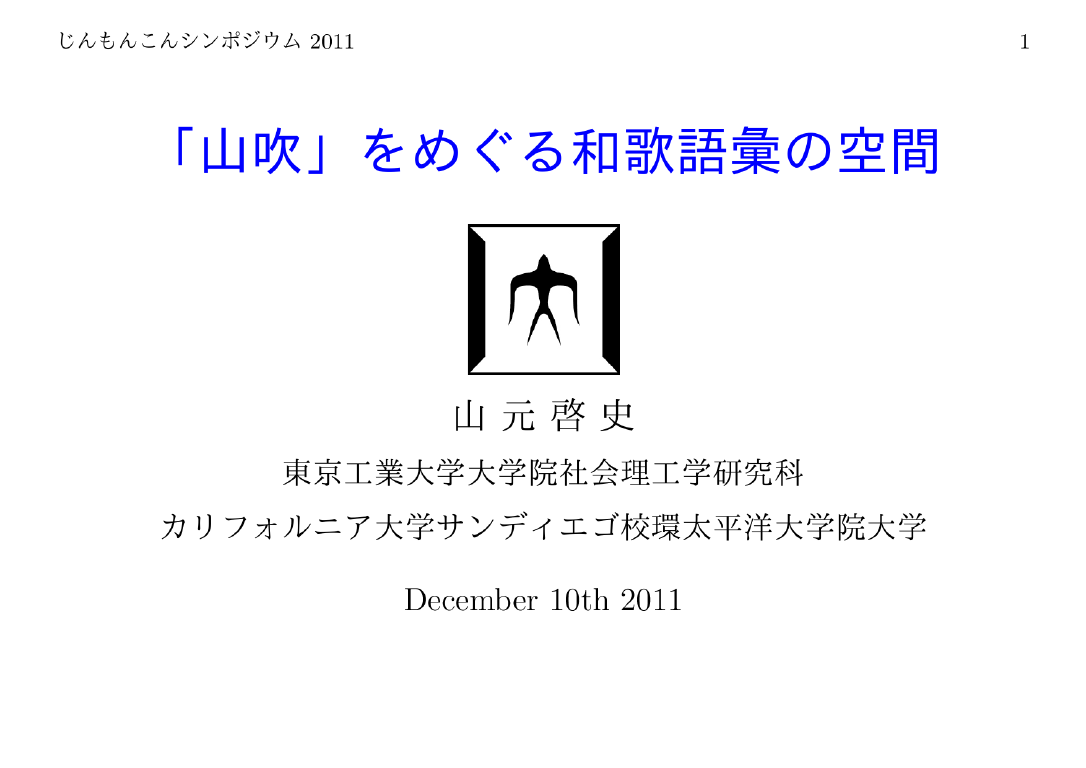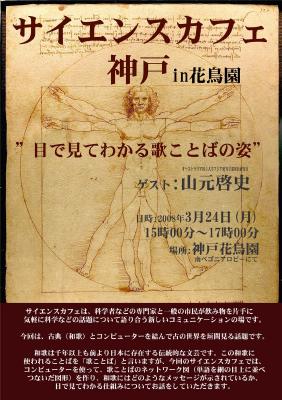Recent or upcoming event
-
2024/09/18-20:
Presentation at JADH2024
- 2024/08/01,02: The final Hirameki Tokimeki Science was successfully completed. Thank you very much for your participation. This concludes the 10-year Hirameki Tokimeki Science.
-
2024/03/25:
This year as well, the 10th year, "Hirameki Tokimeki Science" has been accepted as a
scientific research grant.

It has been accepted for 10 consecutive years. I think it is a happy thing that I was able to introduce linguistic research to elementary and junior high school students for 10 years. - 2023/12/27: Hirameki Tokimeki Science December has successfully ended. Thank you very much for your participation.
- 2023/08/04: Hirameki Tokimeki Science August has successfully ended. Thank you very much for your participation.
- 2023/04/04: Mr. Chen Xudong of our laboratory has become a researcher at the Japan Society for the Promotion of Science.
-
2023/03/24:
This year as well, the 9th year, "Hirameki Tokimeki Science" has been accepted as a
scientific research grant.

This is the 9th year. JSPS has adopted it for 9 years. Every year, 20 to 30 elementary and junior high school students participate, so more than 200 people have come to Tokyo Tech. (Since more than half of the participants were parents, the number may be more than 300.)
Every time we hold it, we are indebted to the research fund support group for checking documents, as well as for meetings, reception on the day, photography, and cleaning up.
Although the corona is downgraded to the fifth type, we would like to implement it while taking measures against infectious diseases. -
2023/02/28:
The application for the scientific research fund basic research (C) "Development of tools and datasets for
analyzing the characteristics of historical changes in song words" has been approved, and we will receive
research funds. Thank you very much.

- 2021/09/08: We received the "Historiographical Institute Poster Prize" at JADH2021 held at the Historiographical Institute, the University of Tokyo. The winning paper is here, and the poster is here.
- 2021/05/28:
- 2021/05/04:
- 2021/04/23:
In this year as well, the sixth year, "Hirameki Tokimeki Science" has been accepted as a scientific research grant.

For junior high school students and elementary school students (both in December 2021 and March 2022), the programs will be held. However, due to the covid19, we do not know whether it can be held for now. - 2021/03/03: Both online and offline, live Hinamatsuri (doll festival) was held: Detail
- 2021/02/01: D4E: dictation for every day, listening practice site has been opened.
- 2021/01/25:
Prayers to get rid of the plague: I made a postcard of Amabie-sama at Tokyo Tech. [version 1][version 2]
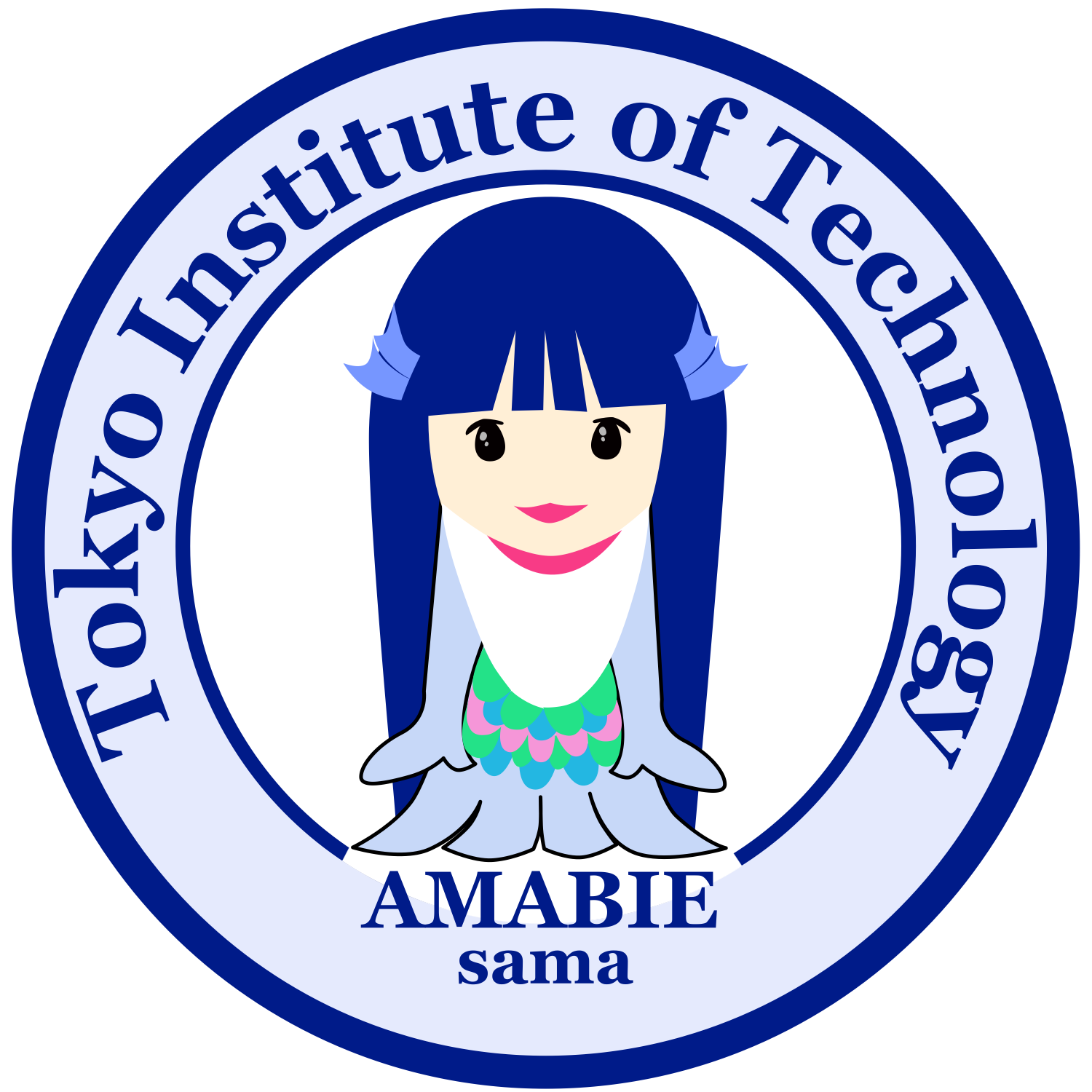
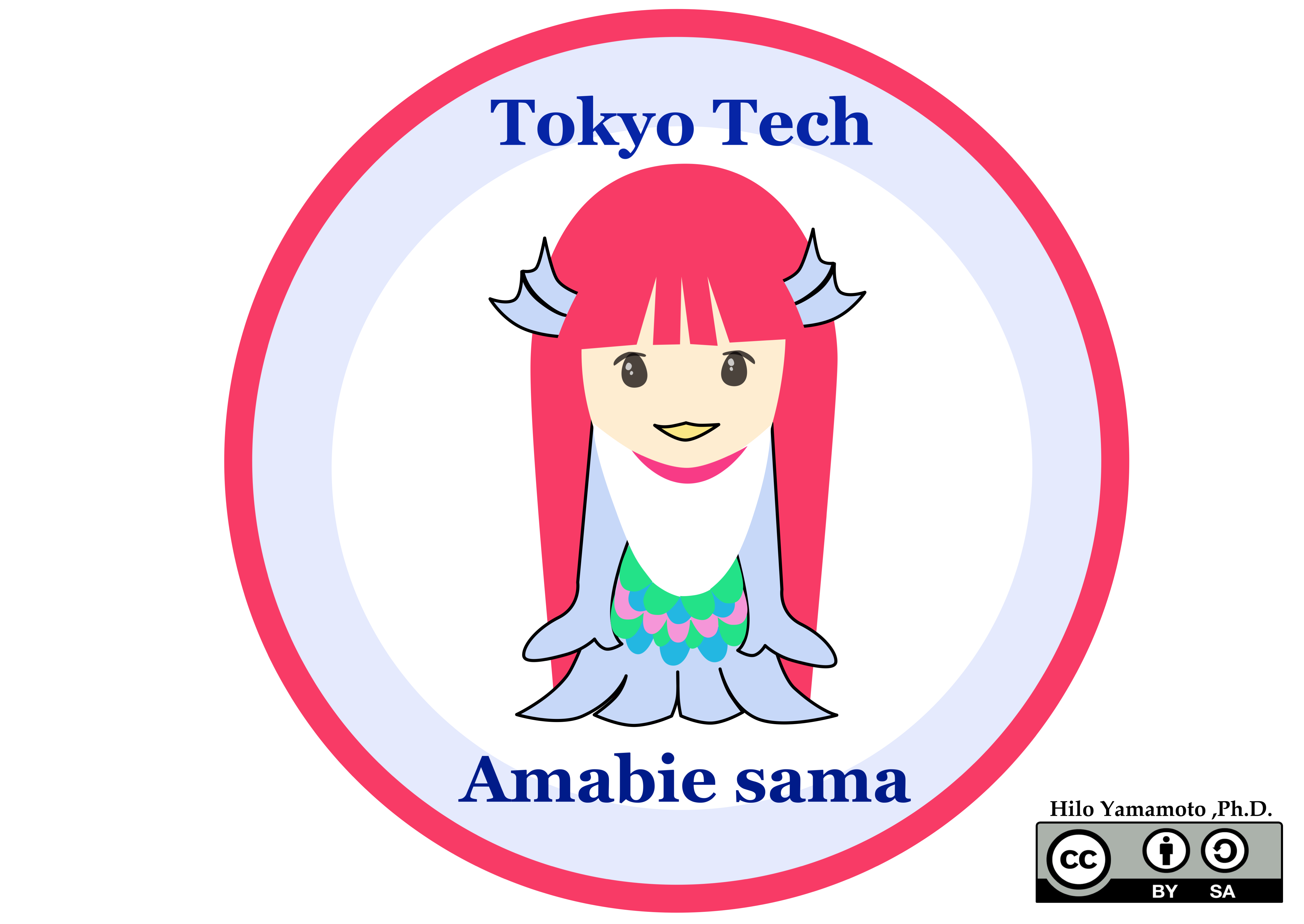
- 2020/09/30: Online placement system LEAP (Language assEssment for Active Performance) started.
- 2020/04/02:
In this year as well, the sixth year, "Hirameki Tokimeki Science" has been accepted as a scientific research
grant.

For junior high school students (in August), and elementary school students (in March, 2021), the programs will be held as well as the last year. However, due to the covid19, we do not know whether it can be held for now. - 2020/02/29: "Development of database of dictation practice for Japanese learners," Feb. 29. 2020 11:30-12:00, at the 25 conference of Database in Humanities" was canceled because of covid19. Our paper has been published at here.
- 2020/02/03: We will present a paper "Development of database of dictation practice for Japanese learners," Feb. 29. 2020 11:30-12:00, at the 25 conference of Database in Humanities" (TRC Toshokan Ryutsu Center Co ltd. Myogadani) Council for Database in Humanities, Japan.
Development of English translations for use in a visualization system of classical Japanese poetic vocabulary
Proceedings of the 13th Conference of Japanese Association for Digital Humanities (JADH2024)
Linguistics: Mathematical Approach of Historical Changes of Language
Theme of this laboratory is:``If we could see a figure of language, what would it be?''There are five senses such as `looking', `touching', `listening', `sniffing', `tasting', but this five senses is also a fundamental way of analysis. Among them, the easiest `seeing', so-called `visualization' is one of technologies that has received much attention now. There are many things to understand by seeing, but there are many worlds that cannot be seen than we expected. Language itself is not originally shaped. However, if a language has a form, what a form it is, which is one of the biggest romances. Through visualization of the language, we are conducting research to consider the appearance of language.
Have you thought about such a thing?
- What is linguistic difference between "J-POP Japanese" and "Manga Japanese"?
- Is the "Samurai language in TV" really a "Samurai language of the time"?
- From when does "young girl speech style" change into "middle aged lady speech style"?
- So, what kind of words will hear in 'middle aged lady speech style'?
- When you come to speak English very well, does that English feel like Japanese?
- What is the secret of a foreigner who can speak Japanese fluently like a Japanese?
- Are there any tips for improving your foreign languages?
- Why is honorific expression difficult?
- Can you think of linguistics by mathematics?
- Can I make diagrams (models) of languages with computers?
- How can we make an average love letter a love letter that makes you unexpected?
- How many words can not be examined in the dictionary?
- How do you know the meaning of words that can not be looked up in a dictionary?
Information
- Our laboratory is seeking applications: Master and Doctor course students who intend to study linguistics in the field of mathematical modeling and quantitative analysis.
- The subject is not only rigid things such as comparison of "Japanese of modern times", or "Japanese of Heian
era."
- How is "Japanese in comics" and "Japanese in drama" different?
- How is "Japanese in J-POP" and "Japanese in Enka (Japanese Folk music)" different?
- How is "Japanese in Manzai (Stand up comedy by two people)" and "Japanese in Rakugo"?
- How is Japanese different from "Western area Rakugo" and "Eastern area Rakugo"?
- Through these differences, if you want to know what is language? You are very welcome.
- If you would like to study linguistics, theory of language, corpus linguistics at the university of science, please contact us.
- If you have never studied linguistics, please come to our class once.
- If it is for the first time to learn Linguistics, it may be difficult. It is, however, a good idea to be a student as a research student.
- We open courses of linguistics in the department of social and human science. I am lecturing on "Fundamentals of linguistics and applied linguistics".
- Please consider those who have already worked and are considering earning a doctor degree for your future career.
- I will consider of the circumstances of your workplace and I can change the time for advising you to your convenient time.
- Please contact us by e-mail for more information.
Credo
- Doing research for truth.
- Being calm.
- Not cheat.
- Foundation firm.
- A fun moment, a chance to learn.
- If you do, you can do it. If you not do, you will never be able to do it.
Project works
- Grant-in-Aid for Scientific Research 2018-2021 A fundamental study of effective visualization and description of longitudinal changes of classical Japanese poetic vocabulary [KAKEN]
- Grant-in-Aid for Scientific Research 2014-2017 A fundamental research on development of thesaurus of classical Japanese poetory and term spatial analysis [KAKEN]
- Grant-in-Aid for Scientific Research 2010-2013 A basic research concerning adjacency probabilities in the development of a morphological analysis dictionary for classical Japanese poetry [KAKEN]
Software, Database
- Kanji Statistic Filter 'ksf'
- POS tagger for Classical Japanese 'kh'
- Japanese kwic 'jk' Concordance
- Japanese string reverse printer 'jr'
- Kokinshu DB
Past event
- 2019/12/26 Hirameki Tokimeki Science for Elementary School Students finished. Thank you very much for your participation.
- 2019/08/30: JADH2019 Kansai University Centenary Memorial Hall, 29-31 August, 2019, I presented "An Analysis of the Differences Between Classical and Contemporary Poetic Vocabulary of the Kokinshu: Hilofumi YAMAMOTO, Bor Hodošček", JADH2019, The 9th conference of the Japanese Association for digital humanities, online edition: ISSN 2432-3144, Print edition: ISSN 2432-3187, pp.68-71., at The Japanese Association for Digital Humanities is pleased to organize its ninth conference, Ninth Conference of Japanese Association for Digital Humanities (JADH2019), hosted by Kansai University Open Research Center for Asian Studies (KU-ORCAS).
- 2019/08/07: August 6th (Tuesday) HIRAMEKI TOKIMEKI SCIENCE 2019 "Time machine-less travel to the past: Visualization of classical and modern Japanese" has ended successfully. Thank you very much for your cooperation. The next event will be held on Thursday, December 26th, with elementary school students.
- 2019/08/01:
Keio University Hiyoshi Campus,
The following research presentations were made at the 121st Humanities and Computer Research Conference.
- Changes in classical Japanese poetic vocabulary between the Kokinshū and the Shinkokinshū: ame (rain) and shiguru (drizzling rain), Hilofumi Yamamoto,Griffen Schwiesow
- A study on individual differences in contemporary Japanese colloquial expressions, Griffen Schwiesow,Hilofumi Yamamoto
- A Study of Constructional Differences between Symphonies and String Quartets by W. A. Mozart Michiru Hirano, Hilofumi Yamamoto
- 2019/06/13: It has been published on the web page of Tokyo Institute of Technology as "Tokimeki Tokimeki Science 2019": Let's go to see the past and the present Japanese: Time machine-less travel to the past. The world of visualization of classical and modern Japanese. It will be open at August 6 (Tuesday) 2019.
- 2019/06/06: The paper for Japan Association for Digital Humanities at Kansai University 2019.8.29-31 was accepted.
- 2019/05/14:
In this year as well, the fifth year, "Hirameki Tokimeki Science" has been adopted as a scientific research
grant.

In addition to the program for junior high school students (summer) that have been implemented for four years this year, we will also carry out a program for elementary school students (winter) that began last year.
The title of the implementation workshop is the same as in the previous yearHIRAMEKI TOKIMEKI SCIENCE 2019 "Time machine-less travel to the past: Visualization of classical and modern Japanese"
- Junior high school seminars will be held on August 6 (Tuesday: limited to 20 people).
- Elementary school students' seminar will be held on December 26 (Thursday: 10 people only).
- We will inform you of the outline and application method later.
- 2019/04/19: Continuing from Sendai First High School last year, Super Science High School, Niigata Minami High School has decided to visit our laboratory. For more information [ here ].
- 2019/02/01: The Japanese section has received the Tokyo Tech Best Teacher Award Grandprix.
- 2018/12/26: Fifth round of Hirameki Tokimeki science (special event for sixth grade of elementary school) finished successfully. This year, the Research Funding Support Section of Tokyo Tech has supported us twice a year. Actually, I am considerably indebted to this, but for me, thank you very much for special supports by the section. Thanks to the Tokyo Tech Research Funding Support Section, we were able to carry out this event for four consecutive years.
- 2018/12/20: The jinmoncon 2018 Student Encouragement Awards News, the news of Michiru Hirano of our laboratory, was posted on the university's Web page.
- 2018/12/03: On Sat 1st Dec. Michiru Hirano of our laboratory presented "Comparison between Mozart's Symphonies and String Quartets Using Infrequent patterns of Pitch-Class Set" at University of Tokyo, and he won the 2018 Student Encouragement Prize.
- 2018/11/30: On Dec. 1st Sat. I will present a poster on Classification of the poets of `cherry blossoms' songs in the Hachidaishu at Jinmoncon 2018 University of Tokyo, Japan.
- 2018/11/27: I gave a lecture this year as well at UCLA Library. Thank you very much for your help.
- 2018/11/12: HIRAMEKI TOKIMEKI SCIENCE 2018 "Time machine-less travel to the past: Visualization of classical and modern Japanese" December 26 Elementary school students version will be held. Information in detail: Here. Until now, it was a junior high school student version, but this time for the first time I will hold an elementary school version. Let's study a lot about language.
- 2018/09/16: JADH 2018 September, 10th, we presented the following paper: "A study on the distribution of cooccurrence weight patterns of classical Japanese poetic vocabulary."; The main point of this paper is that we found that the weighted distribution of co-occurrence patterns (of course, although it may be called co-occurrence) is a normal distribution. Regarding the co-occurrence pattern and the normal distribution, I have ever known it, but I could not present it in the form of a paper for a long time. Regarding the distribution pattern of both tails of the normal distribution, we decided to call the right tail as Content Tail and the left tail as Function Tail. Because it has something similar to that of modern language particles, we used to regard it as a noun located before a particle. Since the shape of the distribution cannot be made consciously by humans, estimating the function of a word from the distribution is essential than a linguist can subjectively make a decision. To put it briefly, I have made such a point.
- 2018/08/11: JADH 2018 September 10th, Hitotsubashi-Hall, we will present "A study on the distribution of cooccurrence weight patterns of classical Japanese poetic vocabulary" and "Collocation Patterns of Pitch-Class Sets: Comparing Mozart's Symphonies and String Quartets."
- 2018/08/01: HIRAMEKI TOKIMEKI SCIENCE 2018 "Time machine-less travel to the past: Visualization of classical and modern Japanese" for junior high school students in summer program was finished on August 1st. Thank you very much for the participations and cooperations. The same program for elementary school students will be open on December 26th.
- 2017/07/06: Seven students of Sendai 1st high school visited me and asked several questions. The school has been selected and assigned as one of super science high school by MEXT (Ministre of Education, Culture, Sports, Science and Technology).
- 2017/04/04: Following the news on adoption of the Graduate School of Science and Technology,
the program of this laboratory,
``Hirameki Tokimeki Science'' was also adopted at the Japan Society for the Promotion of Science.
In addition to the junior high school student program which we have carried out for three years this year, we will also hold a program for elementary school students.
The title of the workshop is the same as last year's as the following:``Time machine-less travel to the past: Visualization of classical and modern Japanese'' The fourth HIRAMEKI TOKIMEKI SCIENCE 2018
- Seminars for junior high school students will be held on August 1 (limited to 20 students).
- Seminars for elementary students will be held on Descember 26 (limited to 10 students).
- Outline and detail of application will be announced at a later date.
''Hirameki(exploring) and Tokimeki(inspiring) Science'' is: A program which provides the essense of fantastic world of science for 5 or 6 year elementary school students, junior high school students, and high school students through the open seminar based on the research conducted by KAKENI, the national grant by Japan Society of the Promotion of Science (JSPS).
- 2018/04/01: Grant-in-Aid for Scientific Research (C)
``A fundamental study of effective visualization and description of
longitudinal changes of classical Japanese poetic vocabulary'' has been approved and I will have the grant.

- 2018/11/01 The news of Best Poster Award are relesed at the pages of the Institute of Liberal Arts: here.
- 2013/03/06: Presentation at Tokyo Institute of Technology
(2013a)Bor Hodoscek, Hilofumi Yamamoto. Futashikana Joho ga Fukumareru Bun no Keishiki, Risk Solution in Engineering Systems 2012, Graduate School of Decision Science and Technology, Tokyo Institute of Technology, Vol. 2012, pp. 236-245, Mar. 2013. - 2012/09/15-17: Presentation at
JADH
2012 University of Tokyo
Makiro Tanka and Hilofumi Yamamoto "Emotive Adjectives and Verbs of the Heian Japanese", p. 52.
Hilofumi Yamamoto, Makiro Tanaka, and Yasuhiro Kondo "Design of Serial Comparison Model for the Diachronic Corpus Study of Japanese", pp. 50-1.
- 2012/09/10: Routledge Comprehensive Grammar Series, Japanese: A Comprehensive Grammar will be published soon. (To Be Published October 24th 2012 by Routledge 692 pages)
- 2012/08/08-13: Presentation at SNPD 2012 Kyoto.
Makiro Tanka and Hilofumi Yamamoto "A Corpus Study of Emotive Adjectives and Verbs of the Heian Japanese"
Hilofumi Yamamoto, Makiro Tanaka, and Yasuhiro Kondo "Diachronic Corpus and Linguistic Space: New Methods for the Analysis of Language Change"
- 2012/08/04-05: Presentation at
NINJAL International Symposium on Valency Classes and Alternations in Japanese (Tokyo: NINJAL)
「平安時代日本語の感情形容詞と感情動詞—『源氏物語』『今昔物語集』 のコーパス分析を通して—」
Makiro Tanka and Hilofumi Yamamoto - 2012/03/20: Presentation at Open Seminar/Workshop for Japanese Teaching and Education Supporting System Using Information Technology hosted Osaka Electro-Communication University. Title: "Informatics and Japanese Education" [leaflet] [slide]
- 2012/03/06: Presentation at
the first workshop for Japanese corpus
(National Institute of Japanese Language and Linguistics)
- Diachronic Corpus and Linguistic Space [slide]
- 2012/02/01: My paper published: "Gurafu o mochiita shugoenzan ni yoru wakayogo no kaiseki" (An Analysis of Poetic Vocabulary Using Boolean Operation and Graph Expression) in Goikenkyu Vol. 9, 2011.
- 2011/12/10: Presentation at
Jinmonkon 2011
(Ryukoku University, Kyoto)
- Lexical Space of Yamabuki (Japanese Kerria) [slide]
- 2011/09/12-4: Presentations at
OSDH 2011 (Osaka)
- Makiro Tanka and Hilofumi Yamamoto "Quantitative Analysis of Loanwords of Eight Literary Works in the Heian Period (794-1185)"
- Hilofumi Yamamoto "Graph Representation of the Connotations of Classical Japanese Poetic Vocabulary"
- 2011/08/22: Presentations at
ASIALEX 2011 (Kyoto)
- Makiro Tanka and Hilofumi Yamamoto "An analysis of Sino-Japanese words of the Heian period for the development of the historical Japanese dictionary"
- Hilofumi Yamamoto and Makiro Tanaka "Development of the thesaurus of classical Japanese poetic vocabulary"
- 2010/04/01: JSPS Research Grant in Aid for the development of Nijuichidaishu Dictionary.
- 2009/02/01: Moved to Japan, Tokyo Tech.
- 2008/06/22: kh dictionaryupdated.
It contains additional entries for Hachidaishu compiled by the National Institute of Japanese Literature (Kokubungaku Kenkyu Shiryokan). - 2008/06/04:
I gave a talk at the Data Science Division, Faculty of Science and
Technology, Department of Mathematics, Keio University.
Modeling and Analysis of Classical Japanese Poetic Vocabulary - 2008/03/24: I gave a talk at Kobe Kachoen.


 https://orcid.org/0000-0001-6876-139X
https://orcid.org/0000-0001-6876-139X